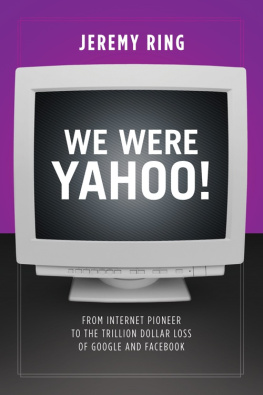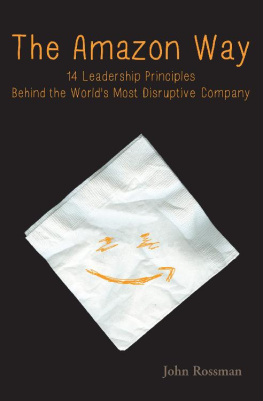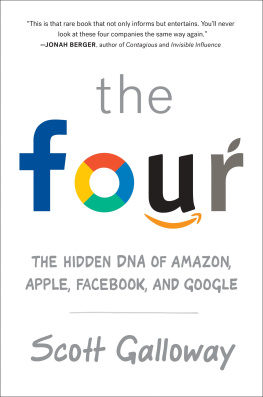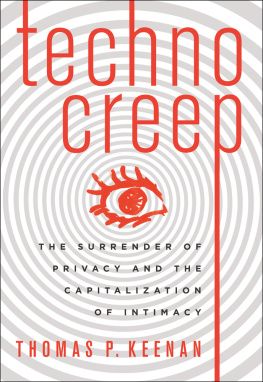A POST HILL PRESS BOOK
ISBN: 978-1-68261-578-2
ISBN (eBook): 978-1-68261-579-9
We Were Yahoo!
From Internet Pioneer to the Trillion Dollar Loss of Google and Facebook
2017 by Jeremy Ring
All Rights Reserved
No part of this book may be reproduced, stored in a retrieval system, or transmitted by any means without the written permission of the author and publisher.

Post Hill Press
New York Nashville
posthillpress.com
Published in the United States of America
CHAPTER 5
A Life We Never Imagined
B y 1999, Yahoo! was established as one of the most important companies in the world. Jerry had appeared on the covers of Newsweek and Business Week . Jerry and David annually appeared on Vanity Fair s top global media entrepreneurs list. Our quarterly stock announcements were hailed as a major media event. The company was growing by leaps and bounds. Keeping up with staff increases became challenging. Every day, there was another reminder, either through the media, client meetings, or water-cooler conversations, that we actually were transforming the world. We changed the way people searched for and discovered information. We altered the way people communicate, and we shifted the entire media landscape in less than five short years. Facebook, Twitter, and YouTube were years away from being invented. Google was a small nascent company, and Apple was teetering on irrelevance. In our minds, we were unstoppable and invincible.
Jerry and David, according to Forbes magazine , were two of the wealthiest individuals in the world and neither was yet thirty-three years old. One night it particularly hit me how far my new world was from my upbringing. Zod Nazem, the chief technology officer of Yahoo!, was hosting a poker game at his estate in Silicon Valley. I was invited along with Jerry, David, and a few other Yahoo! and non-Yahoo! executives. A wonderful personal chef served dinner. After dinner, as the game began, I realized there was a combined net worth of over twenty billion dollars at the table. The collective group could have acquired not just the New York Yankees, but probably all of major league baseball. I kept thinking about the number of Wall Street financial managers who would give their left leg and right arm to be present at that poker game. Interestingly, the groups cheapness was legendary. The game stakes were a quarter high, and the largest pot never exceeded twenty dollars. Ironically, the playing cards were kept in a Gucci case that probably cost more than all the evenings pots combined.
Not long after, we hosted our annual sales meeting in Monterey, California. Monterey is an exquisite, central y located California seaside town overlooking the Pacific Ocean. Its just a few miles from Pebble Beach and home to some of the most beautiful golf courses in the world. Fifteen-hundred-square-foot cottages on the Monterey Peninsula start at over one million dollars. The area is comprised of Monterey, Pacific Grove, Pebble Beach, and Carmel-by-the-Sea. The conference was held at The Monterey Bay Inn, which is located right on Cannery Row, the area made famous by John Steinbeck in his 1945 novel of the same name.
Yahoo! sales executives from across the world arrived for the event. Reps from our offices in every major European and Asian country were present along with our Australian and Canadian colleagues. All of the U.S. sales representatives flew to Monterey as well. Several salespeople arrived a day early to play golf at Pebble Beach or shop in the stores on Ocean Avenue in Carmel. In total, there were more than five hundred worldwide Yahoos at the conference.
To say the mood was festive is an understatement. Our stock had split six times and was still trading close to two hundred dollars per share. Everyone in the room had a net worth of at least a million dollars. Sales assistants from our W est Coast office drove to the meeting in their Porsches and Jaguars. I was responsible for planning many of the sessions for the conference. Anil sincerely hoped that work would be accomplished. One lesson learned is if you want to ensure a successful sales conference, dont give all the employees keys to the mini bar.
One night, word got out that there would be an after-party in my room. Unfortunately, my room was a standard size and could comfortably accommodate no more than five individuals before it was overcrowded. Within twenty minutes there were close to thirty people in the room. God knows what the net worth was, as both Jerry and David were there; Id guess a combined net worth twenty billion dollars was present. All I could think about was that if there were a fire, no one would survive. There was enough wealth to fund the gross domestic product of a small nation that would have gone up in flames. Fortunately, another guest on the same floor had the good sense to call security. Even though it was my room, I was grateful to the hotel staff breaking up the mad scene.
When literally hundreds of young millionaires, with mini-bar keys, and away from home all coalesce at the same spot with no supervision, the results are not good. The hotel damages from the rowdiness added thousands of dollars to the final bill, and a not-so-subtle request was made for us never again hold our conference at The Monterey Bay Inn.
CHAPTER
A Storm is Coming
December 2000
I was closing in on my fifth anniversary with Yahoo! and the sixth year since wed developed the initial advertising program. Unfortunately, the good times ended, and there was nothing subtle about the crash. The excitement wed built over five years diminished in what seemed like five minutes. E-toys and toys.com burned. Then Globe.com imploded. Pets.com and that highly disturbing sock puppet just shriveled away. Global Crossing filed for bankruptcy protection. Already, the AOL-Time Warner merger was considered the largest corporate bust in history. Yahoo!s stock, which had been trading as high as 250 dollars, was now trading below fifty dollars, and it wasnt through with its free-fall. The Dow, which had peaked earlier that year above fourteen thousand, was about to lose close to 50 percent of its value. The Nasdaq, where all the tech stocks were listed, decreased by over 80 percent . Venture capital dried up. Young, stupid internet millionaires who had bought homes in France, nightclubs in New York, and financed movies in Hollywood, all on margin loans, lost all their holdings when the loans were called. Everyday Americans who participated in the internet bubble lost their entire life savings. Retirement vehicles such as 401Ks and others were wiped out. Entrepreneurship, the heart of our nation, was effectively through. With capital dried up, innovation came to a screeching halt.
The bubble burst and with it, dreams were shattered. For a nation of individuals, who had never in history been able to generate money so quickly and with such ease, the collapse was catastrophic. Its harder to have had and lost than never to have had at all. A clich, yes, but oh, so true!
Anil, always the smartest person in the room, gave a sobering speech during our summer sales conference, where we hosted more than five hundred sales executives from across the globe, whose theme was, A storm is coming. I wanted so badly to disagree that the end was near, but for those of us so near to the ground, it was plainly visible; the good times had a short life. We knew clearly what the rest of the world would witness painfully within the year; the bubble had burst. Our awareness wasnt predicated on brilliantly predicting the future; rather, we had all the important indicators slamming us right in our guts, primarily all the web-based start-ups, spending millions of dollars with Yahoo!, all stopped paying us at the same time.
Next page








